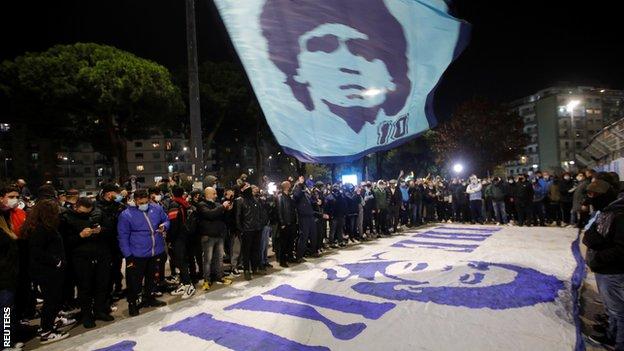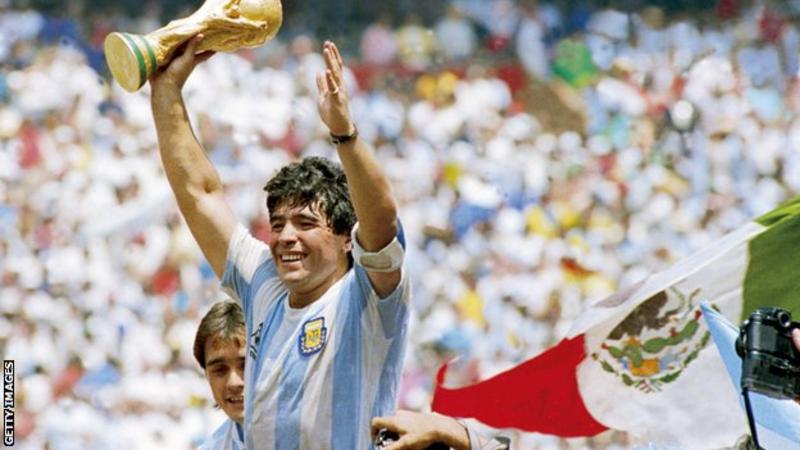Football legend Diego Maradona, one of the greatest players of all time, has died at the age of 60.
The former Argentina attacking midfielder and manager suffered a heart attack at his Buenos Aires home.
He had successful surgery on a brain blood clot earlier in November and was to be treated for alcohol dependency.
Maradona was captain when Argentina won the 1986 World Cup, scoring the famous ‘Hand of God’ goal against England in the quarter-finals.
Argentina and Barcelona forward Lionel Messi paid tribute to Maradona, saying he was “eternal”.
“A very sad day for all Argentines and football,” said Messi. “He leaves us but does not leave, because Diego is eternal.
“I keep all the beautiful moments lived with him and I send my condolences to all his family and friends.
In a statement on social media, the Argentine Football Association expressed “its deepest sorrow for the death of our legend”, adding: “You will always be in our hearts.”
Declaring three days of national mourning, Alberto Fernandez, the president of Argentina, said: “You took us to the top of the world. You made us immensely happy. You were the greatest of them all.
“Thank you for having existed, Diego. We’re going to miss you all our lives.”
Maradona played for Barcelona and Napoli during his club career, winning two Serie A titles with the Italian side. He started his career with Argentinos Juniors, also playing for Sevilla, and Boca Juniors and Newell’s Old Boys in his homeland.
He scored 34 goals in 91 appearances for Argentina, representing them in four World Cups.
Maradona led his country to the 1990 final in Italy, where they were beaten by West Germany, before captaining them again in the United States in 1994, but was sent home after failing a drugs test for ephedrine.
During the second half of his career, Maradona struggled with cocaine addiction and was banned for 15 months after testing positive for the drug in 1991.
He retired from professional football in 1997, on his 37th birthday, during his second stint at Argentine giants Boca Juniors.
Having briefly managed two sides in Argentina during his playing career, Maradona was appointed head coach of the national team in 2008 and left after the 2010 World Cup, where his side were beaten by Germany in the quarter-finals.
He subsequently managed teams in the United Arab Emirates and Mexico and was in charge of Gimnasia y Esgrima in Argentina’s top flight at the time of his death.
World pays tribute
Brazil legend Pele led tributes to Maradona, writing on Twitter: “What sad news. I lost a great friend and the world lost a legend. There is still much to be said, but for now, may God give strength to family members. One day, I hope we can play ball together in the sky.”
Former England striker and Match of the Day host Gary Lineker, who was part of the England team beaten by Argentina at the 1986 World Cup, said Maradona was “by some distance, the best player of my generation and arguably the greatest of all time”.
Ex-Tottenham and Argentina midfielder Ossie Ardiles said: “Thank dear Dieguito for your friendship, for your football, sublime, without comparison. Simply, the best football player in the history of football. So many enjoyable moments together. Impossible to say which one was the best. RIP my dear friend.”
Juventus and Portugal forward Cristiano Ronaldo said: “Today I bid farewell to a friend and the world bids farewell to an eternal genius. One of the best of all time. An unparalleled magician. He leaves too soon, but leaves a legacy without limits and a void that will never be filled. Rest in peace, ace. You will never be forgotten.”
Boca Juniors, where Maradona enjoyed two spells and finished his career, gave “eternal thanks” to their former player.
Paris St-Germain and Brazil forward Neymar posted a photo of him as a youngster with Maradona, calling the Argentine a “legend of football”.
England captain Harry Kane and forward Marcus Rashford also paid tribute.
Barcelona was the first club outside of Argentina that Maradona played for. He scored 22 goals in 36 appearances between 1982 and 1984.
Another of Maradona’s former clubs, Napoli, paid tribute. He played for the club between 1984 and 1991, making 188 appearances.

‘It was in football he found his peace’ – analysis
South American football writer Tim Vickery
He was an everyman Argentine, who lived out a national fantasy with the way he scored his two goals in that 1986 quarter-final win over England.
Scoring those goals, against that opponent, turned Maradona almost into a deity in the eyes of some of his compatriots – with disastrous consequences. Living the aftermath was not easy.
Without the discipline of football, the second half of his life was a chaotic affair.
But it was in football that he seemed to find his peace. As a fan he would turn up at the stadium of his beloved Boca Juniors, take off his shirt, swirl it around his head and lead the chanting.
For many his spontaneity and fallibility were part of the appeal.
His admirers thrived on the way he would fall down only to get back up again. It humanised a figure whose epic life was as mazy as one of his left-footed dribbles.





